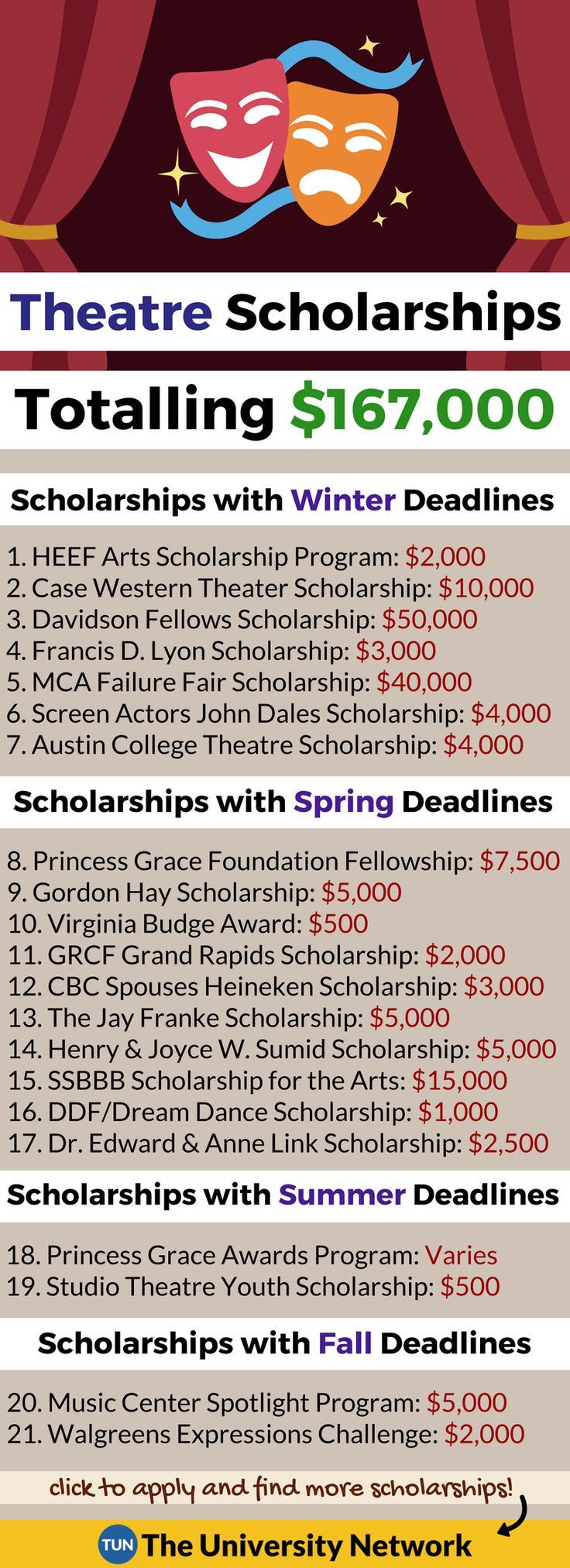
Chasing Footlights and Funding: My Journey to Theatre Scholarships
I remember it like it was yesterday, standing backstage, the air thick with anticipation and the scent of old velvet and stage paint. My heart hammered against my ribs, a frantic drum solo, but it wasn’t fear I felt. It was pure, unadulterated excitement. The house lights dimmed, the audience hushed, and then, the spotlight hit. That moment, stepping into the warm glow, delivering my first line, feeling the energy surge from the crowd – that was it. That was the moment I knew, with every fiber of my being, that theatre wasn’t just a hobby. It was my calling.
But dreams, especially big, vibrant, spotlight-drenched dreams, often come with a hefty price tag. As high school graduation loomed, the practicalities began to creep in. University applications, audition fees, headshots, travel for callbacks… it all added up. My family, bless their hearts, were incredibly supportive, but the idea of paying for a specialized performing arts education felt like asking them to buy a small island. Doubt, a sneaky little understudy, started to whisper in my ear: "Maybe this isn’t for you. Maybe you should pick something ‘safer,’ more ‘sensible.’"
I was at a crossroads, my passion burning bright, yet shadowed by financial reality. It felt like standing on a magnificent stage, ready to perform, but realizing the curtain was stuck, and the show couldn’t go on. That’s when my theatre teacher, Ms. Eleanor Vance, a woman whose wisdom was as profound as her love for Shakespeare, pulled me aside after a particularly grueling rehearsal. She saw the worry lines etched on my young face, the way my shoulders slumped when we talked about college applications.
"What’s got you so down, kid?" she asked, her voice a warm embrace.
I spilled it all out, the fear of disappointing my family, the guilt of wanting something so seemingly extravagant, the gnawing anxiety about how I’d ever afford to study theatre at a good institution. She listened patiently, then smiled, a knowing, gentle smile that crinkled the corners of her eyes.
"Have you ever thought about theatre scholarships?" she asked, as if revealing a secret passage to a hidden treasure.
My mind went blank. Scholarships? For theatre? I’d heard of academic scholarships, athletic scholarships, but scholarships for performing? It felt like a myth, a tale told to wide-eyed dreamers. That conversation with Ms. Vance was a turning point. It was the moment the curtain started to rise, revealing a glimmer of hope. It sparked a quest, a journey to uncover every possible avenue of funding that would allow me to pursue my passion. And let me tell you, it was a journey filled with discovery, hard work, and a fair share of nail-biting moments.
The world of theatre scholarships, I quickly learned, is vast and varied, much like the characters in a classic play. It’s not a single, monolithic entity, but a mosaic of opportunities waiting to be pieced together. My initial research felt like trying to find a specific prop in a massive, cluttered costume shop – overwhelming, but exciting once you start categorizing.
I discovered that theatre scholarships generally fall into a few big categories. First, there are merit-based scholarships. These are awarded based on your talent, your skill, and your potential. For an actor, this means showcasing your acting prowess through monologues and scene work. For a musical theatre enthusiast, it’s about your singing, dancing, and acting chops. Technical theatre students would submit portfolios of their set designs, lighting plots, costume sketches, or stage management experience. These scholarships are often the most competitive, as they seek out the brightest stars.
Then there are need-based scholarships, which are primarily determined by your family’s financial situation. These often require you to fill out forms like the FAFSA (Free Application for Federal Student Aid) in the United States, which helps institutions understand your financial need. Sometimes, a scholarship might be a combination of both merit and need, looking for talented individuals who also require financial assistance to attend.
Beyond those broad strokes, scholarships get even more specific. I found scholarships tailored for particular theatre disciplines:
- Acting Scholarships: For those who live to inhabit characters and tell stories through performance.
- Musical Theatre Scholarships: A triple threat’s dream, requiring excellence in singing, dancing, and acting.
- Technical Theatre Scholarships: For the unsung heroes behind the scenes – designers, stage managers, costumers, lighting technicians, sound engineers.
- Playwriting Scholarships: For the wordsmiths who craft the narratives and build new worlds.
- Directing Scholarships: For the visionaries who bring stories to life from concept to stage.
- Dance Scholarships: Often overlapping with musical theatre, but also for those focused purely on dance as a performing art.
And the sources? Oh, the sources are endless! You have:
- University-specific scholarships: Most drama schools and university theatre departments offer their own funding opportunities to attract top talent. These were often the biggest chunks of aid.
- National and regional organizations: Foundations, arts councils, and theatre associations often have scholarship programs. These might be open to students across a wider geographical area.
- Local community groups: Don’t overlook your hometown! Local theatre companies, rotary clubs, women’s clubs, or even generous individual patrons might offer scholarships to students from their area pursuing the arts.
- Specific demographic scholarships: Some scholarships target students from underrepresented backgrounds, certain ethnicities, or those with unique life experiences.
It felt like I was mapping out a complex theatrical plot, identifying all the characters (the scholarships) and their motivations (their criteria). The key, I realized, was not just to find them, but to truly understand what each one was looking for.
Once I had a decent list, the real work began: the application process. This wasn’t like applying for a regular academic scholarship. For theatre, your application is a performance in itself, a carefully constructed narrative designed to showcase not just your grades, but your passion, your talent, and your unique artistic voice.
The cornerstone of almost every theatre scholarship application was the essay. This wasn’t just about good grammar; it was about storytelling. I learned to write essays that weren’t just answers to prompts but reflections of my soul. Why theatre? What does it mean to me? What kind of artist do I aspire to be? I remember one essay where I described the transformative power of embodying a character, how it felt to step into someone else’s shoes and understand a different perspective. I tried to convey my genuine love for the craft, my dedication, and my vision. Ms. Vance always told me, "Don’t just tell them you love theatre; show them how it lives inside you." And that became my mantra for every essay I wrote. I poured my heart onto the page, making sure my personality and artistic philosophy shone through.
Next came the letters of recommendation. These were crucial. I didn’t just ask any teacher. I sought out teachers and mentors who had seen me at my best, who understood my commitment to theatre, and who could speak to my work ethic, my talent, and my character. My theatre teacher, my English teacher (who saw my analytical skills and creativity), and the director of my local community theatre group were my go-to people. I made sure to provide them with my resume, a list of the scholarships I was applying for, and a brief reminder of my accomplishments and why I was pursuing theatre. This helped them write strong, specific letters that truly advocated for me.
But perhaps the most nerve-wracking, yet exhilarating, part of applying for theatre scholarships was the audition or portfolio submission. This is where you truly shine, or at least, where you get the chance to.
For acting scholarships and musical theatre scholarships, this meant preparing a selection of monologues and/or songs. I spent countless hours refining my pieces. For monologues, I chose contrasting contemporary and classical pieces that showcased my range. I worked on understanding the text, developing distinct characters, and bringing emotional depth to each performance. For musical theatre, it was about finding songs that highlighted my vocal abilities and acting through song. I practiced my dance calls until my feet ached, ensuring my technique was clean and my movements expressed emotion. I even learned how to film self-tapes that looked professional, paying attention to lighting, sound, and background. This often felt like putting on a mini-production just for myself, but it was essential.
For technical theatre scholarships, the "audition" was a meticulously curated portfolio. This could include blueprints of set designs, photographs of lighting plots I’d executed, costume sketches with fabric swatches, stage management prompt books, or examples of prop construction. It was about demonstrating not just creativity, but practical skills, problem-solving abilities, and a deep understanding of the craft. My friends pursuing technical theatre spent hours photographing their work, organizing it digitally, and writing detailed descriptions of their contributions to various productions. It was clear that the same passion I had for performing, they had for crafting the world around the performance.
Beyond the artistic components, there were the more mundane but equally important details: official transcripts, standardized test scores (if required), and of course, the ever-present FAFSA. Each scholarship had its own set of rules, its own deadlines, and its own unique application portal. Organization became my best friend. I created a spreadsheet, meticulously tracking each scholarship, its requirements, its deadline, and the status of my application. I set reminders, chased down recommendations, and double-checked every single submission. It was a full-time job on top of my schoolwork and theatre rehearsals, but the potential reward kept me going.
Then came the waiting game. Oh, the waiting game! It felt like an eternity. After pouring so much of myself into each application, each audition, each essay, the silence was deafening. There were rejections, of course. Some were polite emails, others were thick envelopes that felt heavy with disappointment even before I opened them. Each one stung, a little pinprick in my hopeful balloon. It was easy to get discouraged, to let that sneaky understudy of doubt creep back onto the stage.
But Ms. Vance had also taught me resilience, the actor’s grit. "Every ‘no’ gets you closer to a ‘yes’," she’d say. "Learn from it, adjust, and keep going." And so I did. I re-read my essays, watched my audition tapes, and tried to understand where I could improve. I talked to my mentors, who reminded me that rejections often have less to do with my talent and more to do with the specific needs of a program or the sheer volume of applicants.
And then, one crisp spring afternoon, it happened. An email popped into my inbox, the subject line a burst of sunshine: "Congratulations – Theatre Arts Scholarship!" My hands trembled as I opened it. It was from a university I deeply admired, a program renowned for its holistic approach to theatre education. They were offering me a substantial scholarship, enough to make my dream not just a possibility, but a reality.
I remember letting out a choked cry, a mixture of relief, joy, and disbelief. My parents, who had been quietly supporting me through every step of this arduous process, teared up too. It wasn’t just money; it was validation. It was an affirmation that my passion, my dedication, and my talent were seen and valued. It was the universe telling me, "Yes, your show will go on."
Receiving that theatre scholarship wasn’t just about the financial aid, though that was an enormous relief. It was about the freedom it gave me. The freedom to immerse myself fully in my studies, to explore every facet of theatre without the constant pressure of financial strain. It allowed me to take risks, to audition for challenging roles, to delve into directing, to learn about lighting design, to truly grow as an artist. It connected me to a community of like-minded individuals who were just as passionate and driven. It opened doors I never knew existed, leading to internships, summer stock opportunities, and ultimately, a career doing what I love.
So, for any aspiring artist out there, standing at your own crossroads, looking at the seemingly insurmountable financial hurdle, let me share a final act of advice, a playbook for your own success:
- Believe in Your Art: Your passion is your superpower. Let it fuel your search and shine through every application.
- Start Early, Stay Organized: The scholarship search is a marathon, not a sprint. Give yourself ample time, create a system for tracking, and stick to deadlines.
- Research Relentlessly: Dig deep. Look at university websites, national arts organizations, local community groups, and even online scholarship databases. Don’t leave any stone unturned.
- Tailor Every Application: This isn’t a one-size-fits-all endeavor. Each scholarship has specific criteria. Customize your essays, monologues, songs, or portfolio to speak directly to what they’re looking for.
- Craft a Compelling Narrative: Your application is your story. Make it authentic, engaging, and memorable. Let your unique artistic voice resonate.
- Seek Mentorship: Lean on your teachers, directors, and counselors. They have invaluable experience and can provide guidance, recommendations, and much-needed encouragement.
- Practice, Practice, Practice: For auditions, there’s no substitute for preparation. Refine your pieces, get feedback, and be ready to perform at your best. For portfolios, meticulously curate your work.
- Develop Resilience: You will face rejections. It’s part of the journey. Learn from them, don’t take them personally, and keep moving forward.
- Don’t Be Afraid to Ask for Help: Whether it’s for essay review, audition coaching, or understanding financial aid forms, there are people who want to see you succeed.
The stage lights are waiting for you. The stories are waiting to be told. Don’t let the fear of funding dim your spotlight. Theatre scholarships are out there, waiting for passionate, dedicated artists like you. Go find them, apply with all your heart, and prepare to take center stage in your own incredible story. Break a leg!


